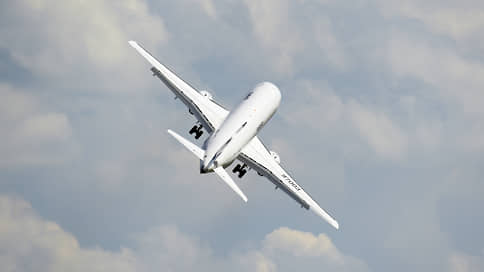“Superjet” will go by wire – Newspaper Kommersant No. 33 (7478) dated 27.02.2023
[ad_1]

As Kommersant found out, the Federal Grid Company (FGC) has acquired a new SSJ-100. The value of the deal, concluded at the end of 2020, is estimated by Kommersant’s sources at 3.5–4 billion rubles, and the VIP layout of the cabin at about another $10 million. The company already has Bombardier Global, which it does not plan to get rid of. According to Kommersant, FGC will spend 2.3 billion rubles on the operation of two liners. three years, although the need for flights has fallen sharply. Since the beginning of the sanctions, big business and private buyers have shown interest in SSJ in the VIP version. But, as market participants note, there are no free boards, and therefore top managers are content with Aeroflot’s business class or rent business jets.
As sources in the aviation industry told Kommersant, FGC (which is in the process of merging with Rosseti) bought a new Superjet-100 from PJSC Irkut (part of the UAC) in a layout for 16 seats with an increased flight range. The amount of the transaction, according to Kommersant, amounted to 3.5-4 billion rubles. Information about the purchase of Kommersant was confirmed by both parties to the transaction. FGC says that “the cost of the aircraft corresponds to the market value at the date of purchase.” The UAC clarified that the contract was concluded at the end of 2020 and “involves the delivery of a new aircraft, which is at the stage of retrofitting with optional equipment.”
According to Kommersant, the aircraft is at the Tulpar Aero Group sites in Kazan to reconfigure the cabin into a VIP version. Work should be completed by the end of April.
According to Kommersant’s interlocutors, the customer will pay about $10 million more for the VIP cabin. The cost of remarketing for the VIP board is $2-10 million, Pavel Zakharov, managing director of Jet24, confirms: the main costs are associated with electrical communications, installation of security systems and entertainment modules with “smart lighting” and seat settings.
The Business Aviation Association estimates that Russian customers used about 500 business jets before the sanctions. According to experts, the actual number of planes affiliated with the Russians exceeds 600-800. To date, according to Pavel Zakharov, about 150-200 aircraft have been transferred to Russian registration, which has opened up the possibility for them to fly to “non-European countries.” At the same time, customers, Mr. Zakharov notes, in 2022 showed interest in domestic aircraft, but there are no boards in the free sale. Potential customers are also concerned about possible difficulties with servicing the Russian-French SaM-146 engines.
Rosseti already has a Bombardier Global 5000 business jet. Among large companies, Gazprom uses its aircraft (including 10 SSJ-100 and 14 Falcon business jets) and Severstal airline (four SSJ-100 in the passenger version and four regional Bombardier CRJ-200s). But more often top managers rent business jets, says BJET CEO Alexei Butrimov. According to him, there is no serious desire on the market to buy SSJs to replace foreign aircraft, since “80% of the domestic aircraft consists of exclusive components and it is more difficult to maintain than Bombardier.”
As a participant in the business aviation market told Kommersant, his client discussed the possibility of remarketing the dismantled Tu-214 put up for sale by Ilyushin Finance Co. (part of Rostec). “The price and image risks stopped: attention would be drawn to the business that “takes” aircraft from civil aviation,” the Kommersant source clarifies.
The interlocutor of Kommersant calls the acquisition of the second aircraft by FGC “a bold move against the backdrop of demonstrative cost cutting in the rest of the public sector.”
According to Kommersant, FGC planned to conclude a contract for the operation and maintenance of Bombardier with the RusJet airline: at the stage of discussing the conditions, it was assumed that the company would receive almost 1 billion rubles for services. for three years, and the contract for the management and operation of the SSJ-100 for the same period in the company was estimated at another 1.3 billion rubles.
Kommersant’s sources say that during the negotiations on the service, FGC admitted that the need for flights using its own air fleet in 2022 compared to 2021 “was significantly reduced.” The company itself does not explain the reasons for preferring its own aircraft to flights of conventional carriers, but emphasizes that “the aircraft will be used for production purposes.” FGC added that Rosseti will continue to operate the Bombardier Global 5000 and “the issue of its sale is not being considered.” At the same time, since 2022, “the aircraft has been transferred to commercial management, which allows minimizing the cost of its maintenance.”
[ad_2]
Source link





